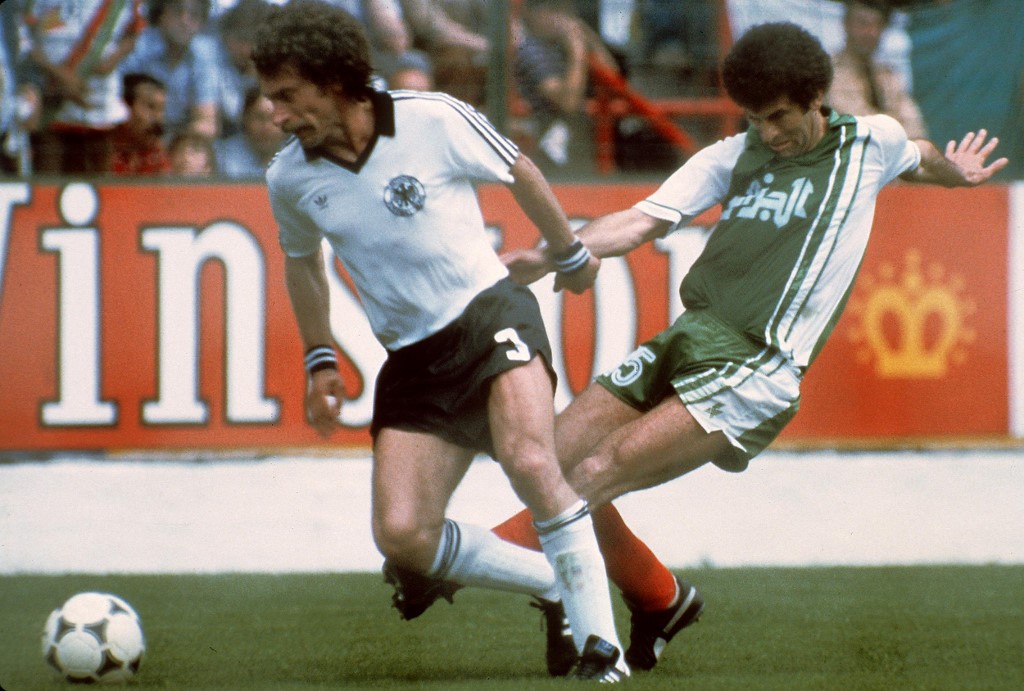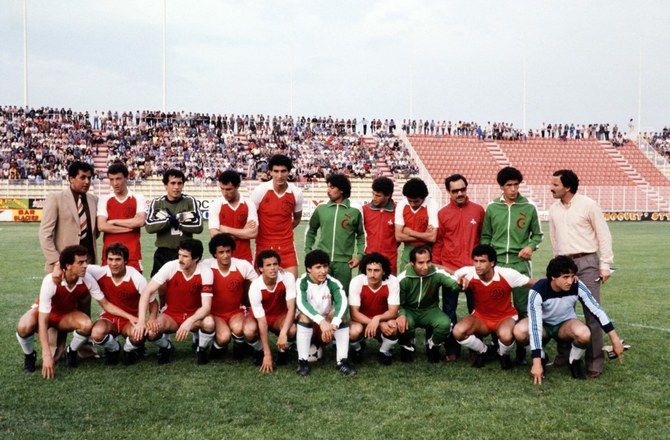DUBAI: The 1982 World Cup in Spain has a strong claim to being one of the best ever. It boasted a stellar line-up of individual players, three great teams, a series of legendary matches, and great weather. It is likely most remembered, however, for its semi-final controversy, its major scandal and, arguably, the greatest World Cup shock of all time.
Algeria had landed in Spain hoping to at least emulate Tunisia’s achievement four years earlier by winning a World Cup match at their first time participating in one.
But everyone could agree that victory was unlikely to come against mighty West Germany, reigning European champions and, as ever, one of the favorites to win the competition.
It probably would not come against Austria either. Perhaps, it would come in what was likely to be a dead rubber against Chile in their last group match.
Which shows just how wrong everyone can be.
Algeria had reached the semi-finals of the 1982 Africa Cup of Nations in Libya only three months earlier, before losing to eventual winners Ghana. But Rachid Mekhloufi’s team had bigger fish to fry and had timed their momentum to perfection.
The Germans, having drawn against Tunisia at Argentina 78, inexplicably chose to belittle Algeria in the run up to the match on June 16, 1982 at the Estadio El Molinón in Gijon, a city that would come to represent the greatest and most harrowing moments in the African nation’s football history.
“If we don't beat Algeria, we’ll take the next train home,” said coach Jupp Derwall, clearly a man who does not believe in tempting fate. Or, for that matter, researching the opposition.
Famously, one player found a way to be even more condescending: “We will dedicate our seventh goal to our wives, and the eighth to our dogs.”
Their expectant dogs would not have enjoyed what came next.

West German defender Paul Breitner, left, tries to control the ball under pressure from Algerian midfielder Mustapha Dahleb during the World Cup first round football match which Algeria won over West Germany, 2-1, on June 16, 1982 in Gijon, Spain. (AFP file photo)
West Germany quite simply could not have imagined they would be up against a team of such caliber.
Algeria more than matched the favorites in the first half, playing fast, one-touch football that had the Germans defending far more than they had expected. The first half finished goal-less, Derwall’s team well behind the pre-match target of eight goals they had set for themselves.
The second half would prove a revelation for Algeria and, it is no exaggeration to say, one of the finest performances of the whole tournament.
On 54 minutes, the brilliant Rabah Madjer — who, playing for Porto, would five years later haunt Bayern Munich in a European Cup final — reacted most quickly after a shot from Lakhdar Belloumi was saved by Harald Schunacher to give Algeria a deserved lead.
There was plenty of time for the Germans to do what they usually do, and sure enough the comeback was underway when Karl-Heinz Rummenigge equalized from close range on 67 minutes. Business as usual now, the Germans must have thought.
Far from being disheartened, however, Algerian players immediately conjured a minor football miracle in every sense.
From the kickoff, a brilliant 10-pass move concluded with Belloumi getting on the end of Salah Assad’s low cross to restore the lead. It was an astonishing goal, worthy of winning any match.
This time, the German players, and presumably wives and pets, were truly stunned.
And there would be no retreat, no settling from a rampant Algeria who spent the rest of the match looking for more goals. They got close several times and never more than when the outstanding Chaabane Merzekane almost finished off a remarkable run from his own half by scoring a third, only to be denied by Schumacher, who had another date with destiny awaiting him later in the competition.
At the final whistle, the Algerian players and substitutes celebrated disbelievingly as the German players trudged off in embarrassment.
Algeria’s 2-1 win arguably surpassed previous World Cup shocks like the USA’s 1-0 triumph over England in 1950, or North Korea beating Italy in 1966, as the unlikeliest of all time.
Having posted two points from a match they were expected to lose, the Algerians were suddenly in the novel position where qualifying from the group stage was a genuine possibility.
But when they faced Austria five days later at Estadio Carlos Tartiere in Oviedo, there would be no repeat of the Miracle of Gijon. Lacking the element of surprise, and no doubt drained by their extraordinary efforts against West Germany, Algeria conceded two second-half goals from Walter Schachner and Austrian legend Hans Krankl, finding themselves third in the group after two rounds of matches.
Austria led the group with four points, while the Germans edged Algeria in second place on goal difference after recovering from the opening match shock to beat Chile 4-1.
It was all down to the last round of matches, and the permutations were many.
On June 24, Algeria recorded a dramatic 3-2 win over Chile, which in hindsight could and should have been far more comprehensive. And decisive.
Algeria had stormed into a three-goal lead after 35 minutes thanks to two goals by Assad and Tedj Bensoula. At that point, they had one foot in the next second round. However, two second-half goals by Miguel Angel Neira and substitute Juan Carlos Letelier left them hanging on for a slender win.
With four points but a goal difference of zero, they were now at the mercy of the outcome of the match between West Germany and Austria, taking place the following day. And how they would pay for it.
An Austrian win or a draw would see Algeria qualify and West Germany head home nine days after they promised they would. A German win of less than two goals, however, would see the European neighbors through and the African debutants exit.
What followed came to be known as the “Disgrace of Gijon”.
Horst Hrubesch scored for West Germany after only 10 minutes, before … nothing happened.
For 80 minutes, Austria and West Germany shamefully sleepwalked their way to a scoreline that was adequate for both teams and that conspired to knock out the gallant, and helpless, Algerians.
Outrage and condemnation came from all quarters. The German media and fans were incensed. And so was the rest of the world.
Hyperbolically, the world’s media cried “El Anschluss,” referring to Germany’s annexation of Austria in 1938.
The incident forced FIFA into a major change: In ensuing World Cups, the last group matches would both be played at the same time. Sadly, that was of little consolation for the Algerians.
West Germany controversially overcame France on penalties in the semi-final after a dramatic 3-3 draw, with Schumacher’s brutal assault on Patrick Battiston leaving the French substitute unconscious, with an injured vertebrae, missing teeth and later in a coma (which he would thankfully recover from). To the delight of many, they lost the final against Italy.
Algeria headed home as heartbroken heroes. They had done all they could to become the first Arab or African nation to progress from the World Cup group stages, but that historic achievement had been cruelly snatched from them by an act of footballing skullduggery.
They would be back. But Spain 82 remains by far Algeria’s most memorable World Cup to date. For all the right and wrong reasons.






















